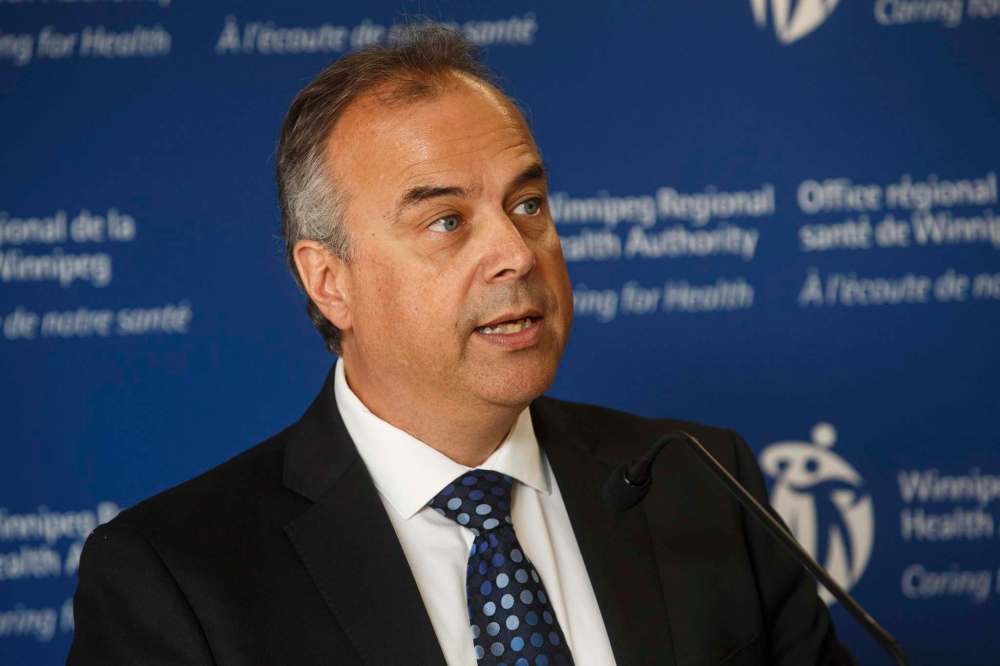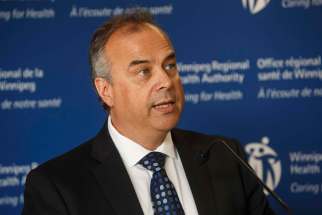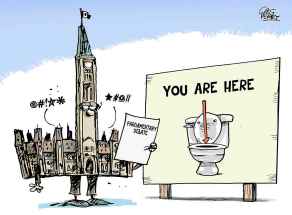WRHA posts modest surplus in 2017-18
Read this article for free:
or
Already have an account? Log in here »
To continue reading, please subscribe:
Monthly Digital Subscription
$0 for the first 4 weeks*
- Enjoy unlimited reading on winnipegfreepress.com
- Read the E-Edition, our digital replica newspaper
- Access News Break, our award-winning app
- Play interactive puzzles
*No charge for 4 weeks then price increases to the regular rate of $19.00 plus GST every four weeks. Offer available to new and qualified returning subscribers only. Cancel any time.
Monthly Digital Subscription
$4.75/week*
- Enjoy unlimited reading on winnipegfreepress.com
- Read the E-Edition, our digital replica newspaper
- Access News Break, our award-winning app
- Play interactive puzzles
*Billed as $19 plus GST every four weeks. Cancel any time.
To continue reading, please subscribe:
Add Free Press access to your Brandon Sun subscription for only an additional
$1 for the first 4 weeks*
*Your next subscription payment will increase by $1.00 and you will be charged $16.99 plus GST for four weeks. After four weeks, your payment will increase to $23.99 plus GST every four weeks.
Read unlimited articles for free today:
or
Already have an account? Log in here »
Hey there, time traveller!
This article was published 01/10/2018 (2631 days ago), so information in it may no longer be current.
The Winnipeg Regional Health Authority lived within its budget last year for the first time since 2011, as it came to the realization it couldn’t spend its way to better patient outcomes, the organization’s interim president and CEO said.
“Overspending our budget was not a good thing for taxpayers or for patients,” said Réal Cloutier, commenting Monday on the WRHA’s annual report.
The WRHA, which operates the city’s hospitals, personal care homes and community health agencies on a budget of nearly $3 billion, finished the 2017-18 fiscal year with a modest surplus of $420,000 after incurring a deficit of $28.5 million the previous year.

Cloutier said the city’s health system achieved “very good results” despite receiving $72-million less in operating funding from the province. Last year, the WRHA reduced its operating expenses by $95 million.
At the same time, the health system saw a rise in the number of clients receiving home care to 15,219, compared with 14,751 the previous year. There was also an 18 per cent improvement (decrease) in ambulance offload delays at city emergency rooms, despite a nearly seven per cent increase in arrivals. Emergency department wait times declined during the year, Cloutier said.
The Winnipeg hospital system also performed 1,000 fewer surgeries than the previous year, as well as 8,000 fewer diagnostic imaging tests. The region had slightly fewer hospital beds 3,160 (compared with 3,192) at fiscal year end, while enrolment in personal care homes dropped to 5,766 from 5,851.
Manitoba NDP Leader Wab Kinew said the report shows government funding cuts are “making health care worse.”
“When you scan through the different indicators, a lot of them are heading in the wrong direction,” he said, noting the city’s notoriously long waits for hip and knee replacements.
“To me, and I think to most people, if you’ve got a problem with surgery wait times, you should be adding OR time, you should be adding surgeries. Yet, this (Progressive Conservative) government is moving in the wrong direction.”
Cloutier said while there were slightly fewer hospital beds in the system, they were much better used than in the past, and more patients were treated. He said it used to be as many as 120 beds were taken up by folks awaiting spots in personal care homes. That number in recent months is closer to 20, as the region has improved community care and created “transitional beds” outside of hospitals for seniors waiting for spots in nursing homes.
The fewer surgeries were largely a result of normal year-to-year variations in surgical numbers, Cloutier said. (Last year, 61,652 procedures were performed versus 62,676 the previous year.)
“We did not cut any budgeted surgical volumes,” he said.
The number of primary hip replacements edged up to 1,565 in Winnipeg last year, compared with 1,506 the previous year. The number of knee replacements also went up slightly (to 1,796 from 1,714).
However, number of critical incidents involving patients also rose — to 81 from 65 — as the regional health authority underwent the most comprehensive reforms in a generation.
Complaints from the public were also up — 3,337 over the course of the year, compared with 3,166 the previous year. And the number of compliments the system received (calls to client relations) sank to 934 from 1,479 the previous year.
“It was a difficult year, but we proved that we can manage our resources in a better way and improve health-care services,” Cloutier said.
larry.kusch@freepress.mb.ca

Our newsroom depends on a growing audience of readers to power our journalism. If you are not a paid reader, please consider becoming a subscriber.
Our newsroom depends on its audience of readers to power our journalism. Thank you for your support.









